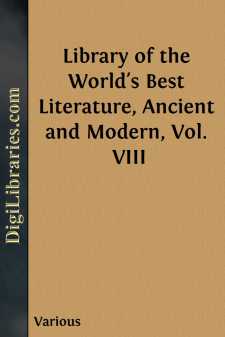Categories
- Antiques & Collectibles 13
- Architecture 36
- Art 48
- Bibles 22
- Biography & Autobiography 813
- Body, Mind & Spirit 142
- Business & Economics 28
- Children's Books 17
- Children's Fiction 14
- Computers 4
- Cooking 94
- Crafts & Hobbies 4
- Drama 346
- Education 46
- Family & Relationships 57
- Fiction 11829
- Games 19
- Gardening 17
- Health & Fitness 34
- History 1377
- House & Home 1
- Humor 147
- Juvenile Fiction 1873
- Juvenile Nonfiction 202
- Language Arts & Disciplines 88
- Law 16
- Literary Collections 686
- Literary Criticism 179
- Mathematics 13
- Medical 41
- Music 40
- Nature 179
- Non-Classifiable 1768
- Performing Arts 7
- Periodicals 1453
- Philosophy 64
- Photography 2
- Poetry 896
- Political Science 203
- Psychology 42
- Reference 154
- Religion 513
- Science 126
- Self-Help 84
- Social Science 81
- Sports & Recreation 34
- Study Aids 3
- Technology & Engineering 59
- Transportation 23
- Travel 463
- True Crime 29
Library of the World's Best Literature, Ancient and Modern, Vol. VIII
by: Various
Description:
Excerpt
ohn Calvin was born in the village of Noyon, in northeastern France, on the 10th of July, 1509. He was intended by his parents for the priesthood, for which he seemed to be peculiarly fitted by his naturally austere disposition, averse to every form of sport or frivolity, and he was given an excellent education with that calling in view; but finally at the command of his father—whose plans for his son had undergone a change—he gave up his theological preparation and devoted himself to the study of law. Gifted with an extraordinary memory, rare insight, and an uncommonly keen reasoning faculty, he speedily distinguished himself in his new field, and a brilliant career was predicted for him by his teachers. His tastes however were more literary than legal, and his first published work, written at the age of twenty-three, was a commentary on Seneca's 'De Clementia,' which brought him wide repute as a classical scholar and as a clear and forceful writer.
Though he had apparently renounced forever all thoughts of a clerical life, he retained, even while he was engaged in the study of law and in the more congenial pursuit of literature, his early love for theology; and in 1532, under the influence of some of Luther's writings which happened to fall into his hands, he was converted to the Protestant faith and threw in his fortunes with the little evangelical party in Paris. His intellectual attainments made him a marked man wherever he went, and he speedily became the leading spirit in the circle to which he had attached himself. Compelled soon afterward by the persecuting measures of King Francis I. to flee the country, he took up his residence at Basle and settled down, as he hoped, to a quiet literary life. It was during his stay here that he published in 1536 the first edition of his greatest work, 'The Christian Institutes,' in which is contained the system of theology which has for centuries borne his name, and by which he is best known to the world at large. Probably no other work written by so young a man has ever produced such a wide-spread, profound, and lasting influence. In its original form, it is true, the work was only a brief and simple introduction to the study of the Scriptures, much less imposing and forbidding than the elaborate body of divinity which is now known to theologians as 'Calvin's Institutes': but all the substance of the last edition is to be found in the first; the theology of the one is the theology of the other—the Calvin of 1559 is the Calvin of 1536. The fact that at the age of twenty-six Calvin could publish a system of theology at once so original and so profound—a system, moreover, which with all his activity of intellect and love of truth he never had occasion to modify in any essential particular—is one of the most striking phenomena in the history of the human mind; and yet it is but one of many illustrations of the man's marvelous clearness and comprehensiveness of vision, and of his force and decision of character. His life from beginning to end was the consistent unfolding of a single dominant principle—the unwavering pursuit of a single controlling purpose. From his earliest youth the sense of duty was all-supreme with him; he lived under a constant imperative—in awe of, and in reverent obedience to, the will of a sovereign God; and his theology is but the translation into language of that experience; its translation by one of the world's greatest masters of logical thought and of clear speech.
Calvin's great work was accompanied by a dedicatory epistle addressed to King Francis I., which is by common consent one of the finest specimens of courteous and convincing apology in existence. A brief extract from it will be found in the selections given below.
JOHN CALVIN.Soon after the publication of the 'Institutes,' Calvin's plans for a quiet literary career were interrupted by a peremptory call to assist in the work of reforming the Church and State of Geneva; and the remainder of his life, with the exception of a brief interval of exile, was spent in that city, at the head of a religious movement whose influence was ultimately felt throughout all Western Europe....












